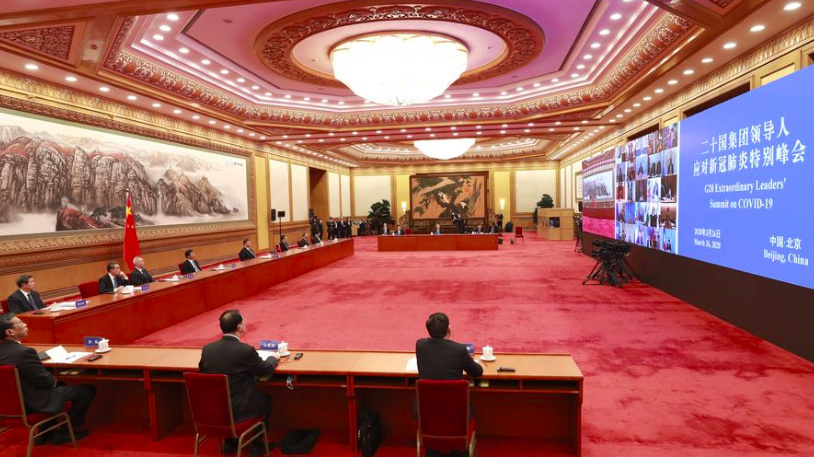
Chinese President Xi Jinping attends the G20 Extraordinary Virtual Leaders' Summit on COVID-19 via video link in Beijing, capital of China, March 26, 2020. /Xinhua
Chinese President Xi Jinping attends the G20 Extraordinary Virtual Leaders' Summit on COVID-19 via video link in Beijing, capital of China, March 26, 2020. /Xinhua
Editor's Note: Cheng Dawei is a professor at the School of Economics at China's Renmin University. The article reflects the author's opinion, and not necessarily the views of CGTN.
Coronavirus has had a great impact on Chinese small businesses. At the beginning of the virus outbreak in China, restrictions on the movement of people, goods, and services, as well as containment measures such as factory closure, greatly affected the manufacturing industry. This month, things are getting better, and businessmen are beginning to look for workers to resume production.
But bad news came when the virus went global. An entrepreneur in Guangzhou sent me a message yesterday. Because of the pandemic, export-oriented small and medium-sized enterprises (SMEs) are facing difficulties. Many business orders have been withdrawn this week, even though some of them were already in production, they were also required to stop. My entrepreneur friend told me he has undergone a huge transformation, which brought him terrible suffering.
Another important concern is the impact of the coronavirus on the global supply chain. In the beginning, some international companies relying on Chinese suppliers felt uncertain. China is the central manufacturing hub of many global business operations, so a slowdown in Chinese production impacts the global supply chain. Now, as the pandemic takes hold across the world, it may take a longer time to get the supply chain back to normal.
The worst thing is the pandemic not only hurts the supply side, but also the demand side. Consumers are more interested in buying toilet paper and hand soap, have less interest in cars and fashion clothes. U.S. Department of Labor reported on March 26 that 3.28 million people filed for unemployment insurance last week. If we cannot stop the spread of this deadly virus, more factories will be closed, more people will lose jobs and the market will face difficulties both from the supply and demand side.
Some governments think to rebuild domestic production power, companies would need to move back home. In the United States, the White House trade adviser Peter Navarro is pushing to "restore" the pharmaceutical and medical supplies supply chain, he is also working on proposing a "buy American" executive order.
We also see some countries imposing trade restrictions and export bans. Yes, the World Trade Organization (WTO) provides a space for members to adopt trade measures deemed necessary to protect public health and public welfare (including import and export bans, quantitative restrictions on imports and exports, and non-automatic import licensing). But are these measures the right tools to protect public health and create market power?
The world is facing a turning point, either to regain its collective capacity for action, to reaffirm free trade, or to build walls, to split, and to reverse globalization. Entrepreneurs and consumers are waiting for a global response.
Good news is that a special G20 meeting was held on March 26 with the aim of coordinating a global response to virus. It was special because leaders had a virtual summit. The virtual summit also included leaders from the World Health Organization, the United Nations, and other international organizations. It is an important step to build a global response to fight virus.
No country is entirely self-reliant, so that people should work together. "It is imperative for the international community to strengthen confidence, act with unity and work together in a collective response," Chinese President Xi Jinping addressed the summit and he called on all G20 members to restore confidence for global economic recovery by cutting tariffs, removing barriers, and facilitating the unfettered flow of trade.
G20 leaders gave an action plan. However, it is not enough, we need real actions.
First, it is very important to have maritime trade channel acting and connecting the global economy. Even if restriction measures to people's movements are in place, trade should not be restricted.

Tianjin port, north China, July 8, 2019. /Xinhua
Tianjin port, north China, July 8, 2019. /Xinhua
Governments need to deal with the negative effects of restrictive preventive measures and find measures to facilitate trade. We call on governments to keep maritime trade moving by allowing ships continued access to ports worldwide and facilitate certain procedures.
Second, governments should develop emergency financing instruments helping SMEs. My entrepreneur friend told me, the Chinese government has pushed commercial banks to help SMEs, however, banks are commercial entities, and are not willing to give loans to small business. How a state's financial assistance can be directly implemented to the poor and SMEs is key.
Third, we need to build an information road, which can help companies along the supply chain to share information. Industry associations can offer help. As I know, APEC has a SME forum, which was trying to build a business network. However, in the past, people talked too much, it is time to take a real step.
Finally, international institutions need to take more collective actions and prepare for the worst. At this moment, little is known about how the virus outbreak will impact on other "non-economic" sectors. When we carefully push the economy back to work, we need to think about non-economic sectors. Humanitarian assistance is needed, for example, to send doctors or experts to the field to advise high-risk worker groups, and prepare a food safety fund for poor people.
G20 and international institutions need to respond to developing countries' initial problems, reducing potential risks.
(If you want to contribute and have specific expertise, please contact us at opinions@cgtn.com)